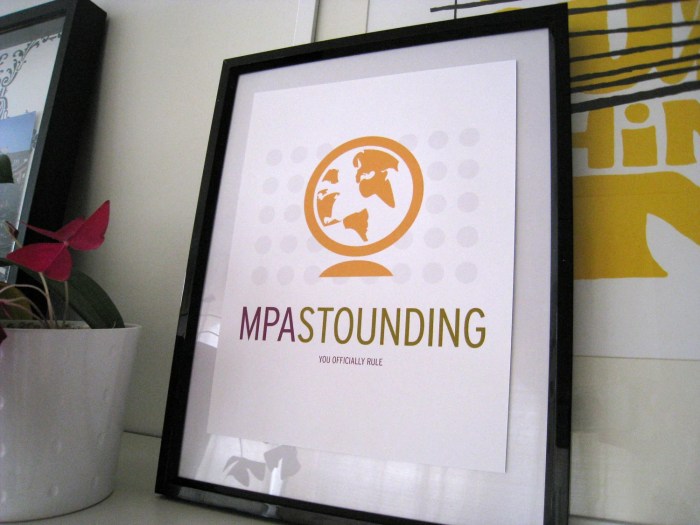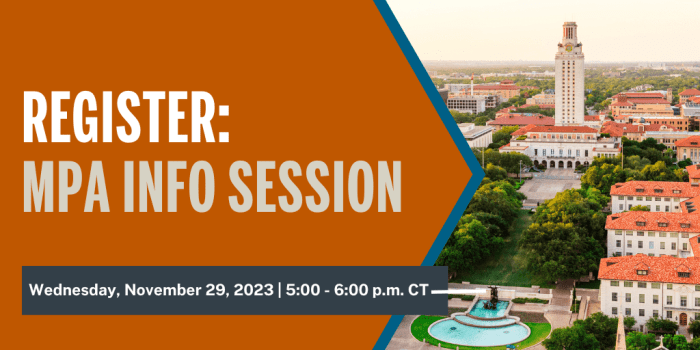Kicking off with mpa master, this program stands at the intersection of theory and practice in public administration, equipping future leaders with the skills necessary to address societal challenges. With a curriculum designed to encompass a range of disciplines, MPA programs prepare students for impactful careers in various sectors, ensuring a solid foundation in public service principles and practices.
As prospective students explore the landscape of MPA programs, they will encounter a diverse array of institutions offering tailored curricula, career opportunities, and flexible learning formats, effectively setting the stage for their professional journeys in public administration.
Understanding MPA Programs: Mpa Master

Master of Public Administration (MPA) programs are designed to equip students with the necessary skills and knowledge to effectively manage public sector organizations and policies. The core objectives of these programs are centered around fostering leadership, enhancing policy analysis capabilities, and promoting ethical governance. Graduates of MPA programs are trained to address complex social issues, advocate for public interests, and implement strategic solutions in governmental, non-profit, and international development contexts.The typical curriculum of an MPA degree encompasses a diverse range of subjects that provide a comprehensive understanding of public administration.
Core subjects generally include public policy formulation, organizational theory, financial management, and human resource management. Students also engage in practical experiences through internships, capstone projects, and case studies, which enable them to apply theoretical knowledge to real-world challenges.
Core Curriculum Components
The curriculum of an MPA program often varies by institution, but it typically includes several foundational courses that are essential for understanding public administration. The importance of these courses lies in their ability to prepare students for various roles in public service, policy-making, and management.
- Public Policy Analysis: Focuses on the processes involved in policy development and evaluation, equipping students with tools to assess the effectiveness of public policies.
- Administrative Law: Covers the legal framework governing public administration, providing insight into the regulatory environment in which public agencies operate.
- Public Financial Management: Teaches budgeting, accounting, and financial reporting in the context of public institutions, emphasizing accountability and transparency.
- Leadership and Ethics: Explores the role of leadership in public service and the importance of ethical decision-making in managing public resources.
- Research Methods: Provides students with quantitative and qualitative research skills essential for conducting evaluations and assessments in public administration.
Institutions Offering MPA Programs
Various types of institutions offer MPA programs, catering to a wide range of student needs and professional goals. Understanding the landscape of MPA education is crucial for prospective students to select the right program that aligns with their career aspirations.
- Public Universities: State and regional universities often provide MPA programs with a focus on local governance and public policy, making them more accessible to students interested in community-oriented careers.
- Private Universities: Many private institutions offer specialized MPA programs that may include a focus on international relations, non-profit management, or urban planning, appealing to diverse student interests.
- Online Programs: With the rise of digital education, various accredited universities offer fully online MPA degrees, providing flexibility for working professionals and international students.
- Executive Programs: Tailored for established professionals, these programs often require work experience and may offer an accelerated curriculum to enhance leadership skills.
Career Opportunities After MPA

The Master of Public Administration (MPA) equips graduates with essential skills and knowledge to navigate the complexities of public service. It opens a wide range of career paths across various sectors, giving MPA holders the ability to effect change in their communities and beyond. This discussion delves into the lucrative and impactful opportunities available to MPA graduates, detailing potential roles, responsibilities, and the corresponding job prospects and salaries in different areas.
Career Paths for MPA Graduates
Graduates with an MPA can pursue diverse roles in public service. The skills acquired during the program, such as leadership, analytical thinking, and strategic planning, are applicable in various sectors, including government, non-profit organizations, and the private sector. Here are some notable career paths:
- Public Policy Analyst: These professionals research and analyze policy issues, providing recommendations to policymakers. They often work for government agencies, think tanks, or non-profit organizations.
- City Manager: City managers oversee the daily operations of municipal governments, ensuring that city services run efficiently and effectively.
- Non-Profit Manager: MPA graduates can lead non-profit organizations, managing resources and programs that address social issues and community needs.
- Human Resources Manager: In a public sector context, these managers handle employee relations, recruitment, and compliance with labor laws.
- Program Director: MPA holders can lead specific public programs, coordinating efforts between various stakeholders to achieve program goals.
Roles and Responsibilities of MPA Professionals
The roles undertaken by MPA graduates often involve leadership, management, and advocacy. These professionals are responsible for developing and implementing policies, managing budgets, and engaging with stakeholders. Key responsibilities may include:
- Strategic Planning: Formulating long-term goals and determining the best actions to achieve them.
- Budget Management: Overseeing financial resources and ensuring efficient allocation to meet strategic objectives.
- Community Engagement: Building relationships with the community and stakeholders to understand their needs and convey relevant information.
- Policy Development: Crafting policies that address public needs while adhering to legal and ethical standards.
- Performance Evaluation: Analyzing program outcomes to assess effectiveness and identify areas for improvement.
Salaries and Job Prospects in Different Sectors
The salary expectations and job prospects for MPA graduates can vary significantly based on the sector they choose. Here’s a comparative overview:
| Sector | Average Salary (Annual) | Job Growth Rate |
|---|---|---|
| Government | $70,000 – $100,000 | 5% (National average) |
| Non-Profit | $50,000 – $80,000 | 10% (Growing demand for community services) |
| Private Sector | $80,000 – $120,000 | 7% (Increased demand for public relations and compliance) |
The government sector often provides stable employment but may have a lower salary ceiling compared to private industry positions. Non-profit roles are crucial for community impact but may come with more modest pay. Conversely, private sector jobs tend to offer higher salaries, reflecting the competitive nature of the business environment and the value placed on management expertise.
“The Master of Public Administration is not just a degree; it’s a passport to a myriad of opportunities to lead, innovate, and create positive change in society.”
Admission Requirements for MPA Programs

Applying to a Master of Public Administration (MPA) program is a significant step for those aspiring to advance their careers in public service or related fields. Each institution may have its own specific criteria, but there are common prerequisites that most MPA programs share. Understanding these requirements can help candidates prepare their applications effectively.The admission process for MPA programs typically involves submitting various application materials that demonstrate a candidate’s qualifications and readiness for graduate study.
Below is a detailed checklist of the materials usually required for application.
As the push for sustainability grows, integrating solar panels into rooftop designs for a greener future becomes increasingly important. This approach not only reduces energy costs but also contributes to reducing the carbon footprint of urban environments. By seamlessly combining functionality and environmental responsibility, rooftop solar solutions pave the way for a more sustainable living.
Common Prerequisites for Applying to MPA Programs
Candidates interested in pursuing an MPA degree generally need to fulfill certain prerequisites, which may include:
- A completed bachelor’s degree from an accredited institution.
- A minimum GPA requirement, often around 3.0 on a 4.0 scale.
- Relevant work or volunteer experience in public service or related fields.
- Standardized test scores, such as the GRE, depending on the program’s requirements.
The following checklist Artikels the application materials that prospective students should prepare:
Application Materials Checklist
Compiling a comprehensive application package is crucial to making a positive impression on admissions committees. The typical requirements may include:
- Application Form: Most programs require a completed application form, often available online.
- Transcripts: Official transcripts from all post-secondary institutions attended must be submitted.
- Standardized Test Scores: GRE or other standardized test scores may be required by some programs, while others may waive this requirement.
- Resume or CV: A summary of academic achievements, work experience, and relevant skills.
- Recommendation Letters: Typically, two to three letters from professionals or academic sources who can speak to the candidate’s qualifications.
- Personal Statement: A written essay detailing the candidate’s motivations for pursuing an MPA, career goals, and how the program aligns with their aspirations.
Both recommendation letters and personal statements play a critical role in the admission process.
Importance of Recommendation Letters and Personal Statements
The recommendation letters provide insights into a candidate’s character, work ethic, and potential for success in graduate studies. Admissions committees value letters from individuals who know the applicant well, as these endorsements can differentiate candidates in a competitive pool. The personal statement serves as a platform for applicants to articulate their passion for public administration and Artikel their career objectives.
A compelling personal statement should reflect self-awareness and a clear understanding of the challenges and opportunities in the public service sector.
In colder climates, effective heating solutions are essential for rooftop designs. Implementing rooftop heating solutions for colder climates not only enhances comfort but also improves energy efficiency during harsh winters. These systems ensure that buildings remain warm and inviting, showcasing how thoughtful design can address environmental challenges while maintaining aesthetic appeal.
“Recommendation letters and personal statements can significantly influence admission decisions by showcasing the applicant’s unique qualities and vision.”
Benefits of Earning an MPA
Earning a Master of Public Administration (MPA) provides numerous personal and professional advantages. This advanced degree equips graduates with essential skills and knowledge that enhance their effectiveness in public service roles and beyond. Professionals who obtain an MPA often find themselves more competitive in the job market, paving the way for significant career advancements.The personal and professional benefits of an MPA extend far beyond the acquisition of theoretical knowledge.
Graduates of MPA programs are trained in a variety of competencies that are essential for leadership in public service, nonprofit organizations, and even private sector roles focused on social impact. The interdisciplinary nature of the MPA curriculum fosters critical thinking, advanced analytical skills, and ethical decision-making capabilities.
Skills Gained Through an MPA, Mpa master
The MPA program develops a unique skill set that distinguishes its graduates in various sectors. Below is a comparative analysis of skills acquired through an MPA versus those gained in other graduate programs, such as an MBA or a Master’s in Social Work (MSW):
| Skill | MPA | MBA | MSW |
|---|---|---|---|
| Public Policy Analysis | ✔ | ✖ | ✖ |
| Governance and Ethics | ✔ | ✖ | ✔ |
| Quantitative and Qualitative Research | ✔ | ✔ | ✔ |
| Leadership in Public Sector | ✔ | ✔ | ✖ |
| Budget and Financial Management | ✔ | ✔ | ✖ |
| Community Engagement and Advocacy | ✔ | ✖ | ✔ |
This comparison highlights the distinctive skills that an MPA program develops, particularly in public policy analysis and leadership in the public sector, which are invaluable for those aiming to create change within their communities and organizations.
Impact on Career Advancement and Networking Opportunities
Graduates with an MPA often experience significant career advancements due to their enhanced qualifications and the robust professional networks they build during their studies. MPA programs typically emphasize real-world applications of theory and foster connections with industry leaders, policymakers, and fellow students who share a commitment to public service.The networking opportunities available through MPA programs can lead to mentorships, collaborations, and job referrals that are crucial for career progression.
Many programs feature guest speakers from prominent public agencies and nonprofit organizations, offering students insights into various career paths. The value of networking in the public administration field cannot be overstated. Relationships formed during graduate studies can yield fruitful collaborations and open doors to positions that may not be publicly advertised. Furthermore, alumni networks often provide ongoing support and resources, enriching graduates’ professional journeys long after they have completed their degree.In conclusion, earning an MPA not only equips individuals with vital skills but also enhances their career trajectories and networking prospects.
The multifaceted advantages of an MPA make it a worthwhile investment for those committed to making a meaningful impact in public service and related fields.
Online vs. On-Campus MPA Programs
The choice between online and on-campus Master of Public Administration (MPA) programs is pivotal for prospective students. Each format presents distinct advantages and challenges that can significantly influence the educational experience and career trajectories of students. Understanding these differences can help individuals make informed decisions based on their personal circumstances, learning preferences, and career goals.
Flexibility and Accessibility Comparison
Online MPA programs offer unparalleled flexibility and accessibility compared to traditional on-campus formats. They allow students to balance their studies with work and personal commitments, making education more attainable for those with busy schedules or geographical constraints. In contrast, on-campus programs provide structured environments that may enhance interaction and networking opportunities among peers and faculty, fostering a sense of community.
The asynchronous nature of many online programs permits students to access materials and complete assignments at their convenience, which is particularly advantageous for working professionals. Conversely, on-campus programs often require attendance at scheduled classes, which can be challenging for those with full-time jobs or family obligations. However, being physically present on campus facilitates immediate engagement and access to resources such as libraries and administrative support.
Major Online MPA Programs and Unique Features
Numerous reputable institutions offer online MPA programs, each with unique features that cater to diverse learning needs and career aspirations. Here is a selection of significant online MPA programs:
- University of Southern California: This program is known for its innovative curriculum that emphasizes leadership in public policy and administration. It provides students with access to a vast alumni network in influential government roles.
- Indiana University: Offering a flexible online MPA, this program allows students to specialize in various public affairs concentrations, enhancing their expertise in specific policy areas.
- Arizona State University: This program is renowned for its interdisciplinary approach, integrating elements from business, sociology, and political science to prepare students for complex public administration roles.
- Northeastern University: Known for its emphasis on experiential learning, Northeastern offers opportunities for students to engage in real-world projects while studying online.
- Pennsylvania State University: This program combines rigorous academic training with practical skills development, allowing students to tailor their education to their career objectives.
Challenges and Advantages of Each Learning Format
Both online and on-campus MPA programs come with their respective challenges and advantages that can affect student outcomes. Online programs, while flexible, may present difficulties in maintaining motivation and discipline due to the lack of a structured environment. Students may also miss out on face-to-face interactions that can enhance learning and networking opportunities.
On the other hand, on-campus programs often require significant time commitments and can be less accommodating to students with jobs or family responsibilities. However, they provide a rich environment for collaboration, mentorship, and direct engagement with faculty and peers, which can be invaluable for professional growth.
“The choice between online and on-campus MPA programs should align with individual learning styles, career goals, and life circumstances.”